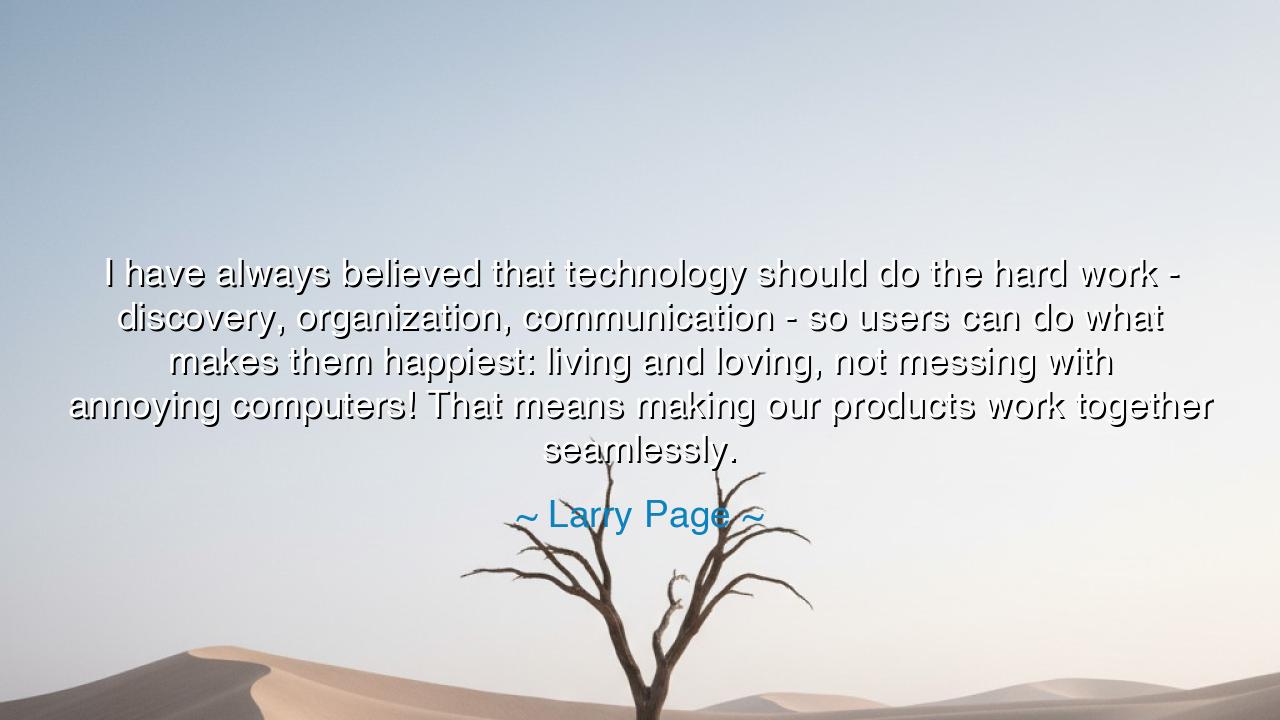
I have always believed that technology should do the hard work -
I have always believed that technology should do the hard work - discovery, organization, communication - so users can do what makes them happiest: living and loving, not messing with annoying computers! That means making our products work together seamlessly.






In the great unfolding of human progress, there comes a time when the tools we forge begin to shape us in return. Larry Page, one of the architects of our digital age, spoke with the voice of both inventor and philosopher when he said: “I have always believed that technology should do the hard work — discovery, organization, communication — so users can do what makes them happiest: living and loving, not messing with annoying computers! That means making our products work together seamlessly.” In this truth lies a timeless vision — that technology, though born of wires and code, must serve human joy, not replace it. The machine should labor so that the spirit may breathe freely.
From the dawn of civilization, mankind has sought to ease the burdens of toil. The plow, the wheel, the loom — each invention was a prayer for freedom from drudgery, a way to grant the human heart more time for beauty, family, and wonder. Page’s words are not the proclamation of a modern engineer alone; they echo the eternal human desire to turn labor into leisure, chaos into order, and confusion into clarity. Where our ancestors tamed the rivers to feed the world, Page and his peers sought to tame information itself — to make sense of the boundless flood of data that the modern age unleashed.
Consider the story of Johannes Gutenberg, who gave the world the printing press. Before his invention, the written word was the guarded treasure of a few. Knowledge was chained to monasteries and palaces, and the common man lived in the dimness of ignorance. But with his press, Gutenberg transformed the landscape of the mind. He made knowledge accessible, organized, and shared, just as Page’s search engines and digital ecosystems would do centuries later. Both men, though separated by ages, shared a common dream: that the power of invention should liberate the soul, not confine it.
Yet, as time advanced, man’s creations grew ever more complex. Machines began to hum with intelligence; screens filled every home. But with this came a paradox — tools meant to save time began to consume it. People found themselves servants to their devices, tangled in notifications, lost in endless networks. Larry Page’s vision was a call to restore balance — to make technology seamless, invisible in its labor, so that humanity might once again look up from the screen and see the sunrise, the face of a loved one, the wonder of life itself. For what is progress if it costs us our peace?
The ancients would have understood this yearning well. The philosophers of Greece taught that the highest form of wisdom was leisure — not idleness, but the sacred rest that allows the mind to contemplate truth and the heart to feel deeply. To them, a life filled with endless labor was a life unexamined. Page’s dream of letting machines handle the tedious tasks of organization, discovery, and communication springs from the same soil — a belief that technology should restore to mankind what the ages of industry and haste have stolen: the chance to live fully and to love deeply.
Thus, the lesson is clear. The purpose of our inventions is not to dazzle us with their complexity, but to disappear into the background of our joy. When you create, when you design, when you build — let your goal be harmony, not noise; liberation, not control. The truest technology is that which becomes invisible in service, allowing its user to return to the essence of being human. A good tool, like a loyal servant, should fade into silence the moment its work is done.
And so, dear reader, remember this teaching as the ancients would: do not worship the machine, but master it with wisdom. Let it carry your burdens but never your soul. Use it to connect, not to isolate; to learn, not to escape; to enhance your humanity, not to diminish it. For as Larry Page reminds us, when technology works together seamlessly, the world grows quieter, lighter, and more whole. Then, at last, you may live not as one bound to the gears of progress, but as one uplifted by them — free to do the most sacred of human acts: to live and to love.






AAdministratorAdministrator
Welcome, honored guests. Please leave a comment, we will respond soon